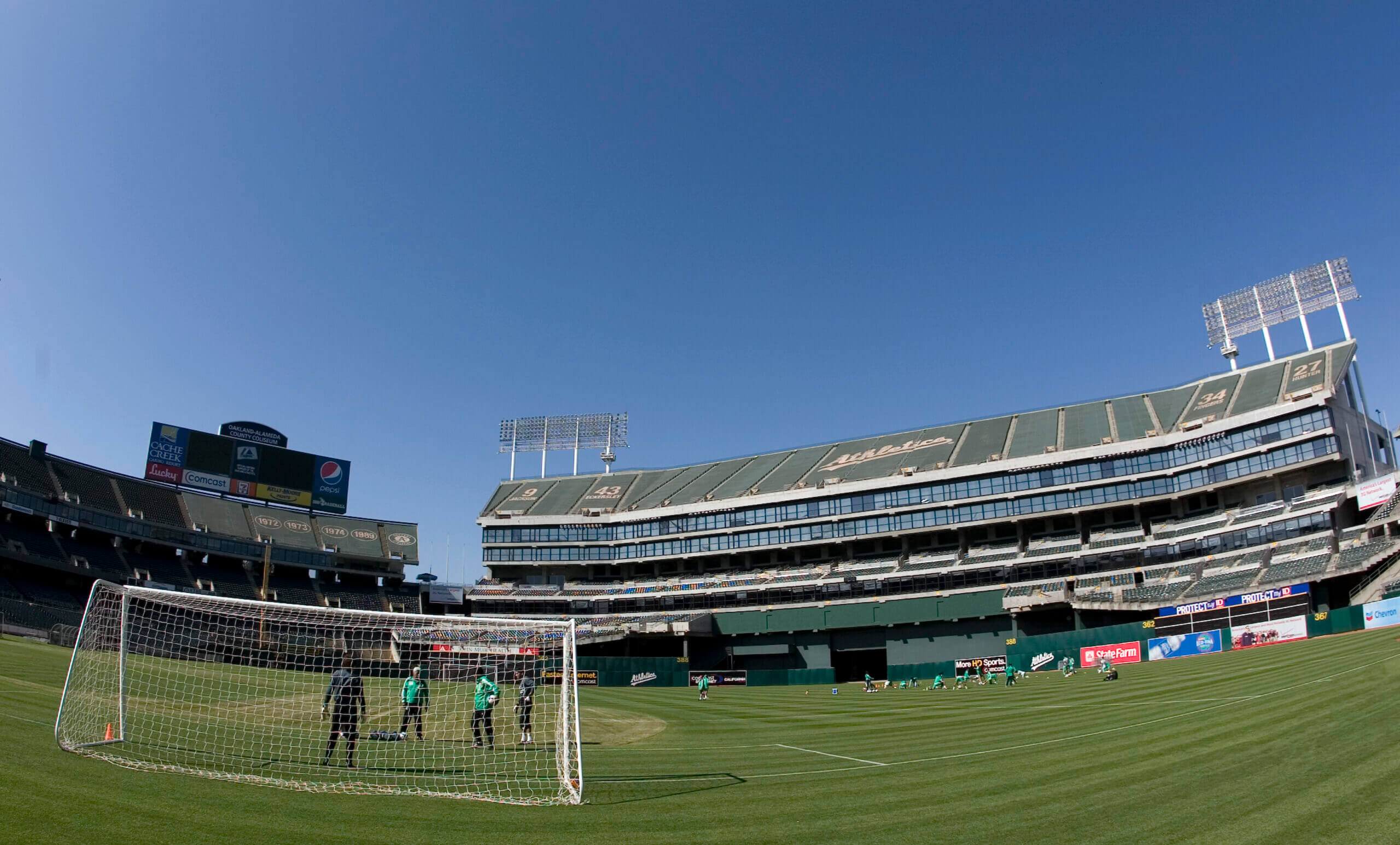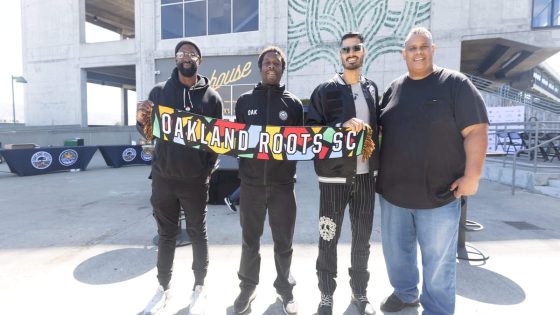On Sept. 26, the Oakland A’s will play their final game at the Oakland Coliseum, their home since 1968. But while the curtain may be falling on the fifth-oldest facility in the major leagues, the Coliseum has at least one more sports season left in it. The Oakland Roots, a USL Championship League soccer club, will make it their home for the 2025 season. The move is part of the Roots’ overall goal to build a more permanent home on the Coliseum property. And ahead of that move they are launching a second community investment round, which they hope will further strengthen their connection to the fans.
Beyond 2025, the future of the Coliseum is to be determined, but recent developments could jump-start a new future for the Oakland-Alameda County Coliseum complex, which for the first time will be solely owned when a pending change in ownership is completed. The African American Sports and Entertainment Group (AASEG) — a Black-owned, East Bay-based development group — has agreements in place with the co-owners of the Coliseum complex, the A’s and the city of Oakland, to purchase the property for a combined $230 million. (The purchase of the A’s half of the property is still pending approval by Alameda County; AASEG is expected to take full ownership in 2026, when the public bonds on the property are fully paid off.)
The Coliseum complex, which includes a hybrid football-baseball stadium and an arena, opened its doors in 1966 and since then has been host to a myriad of major sports and entertainment moments. In addition to the A’s 57 seasons at the Coliseum, the Oakland Raiders played there from 1966-81 and again from 1995-2019. The Golden State Warriors called the arena home from 1971-2019. Soccer has a history at the Coliseum, too. Among the highlights, Pelé took on the Oakland Clippers there in 1968, and David Beckham squared off against the San Jose Earthquakes there in 2008.
The complex has hosted four World Series, four NBA Finals, four AFC Championship games, two AFL Championship games, one MLB All-Star game, and numerous musical legends, including the Rolling Stones, Frank Sinatra, Elvis Presley, Led Zeppelin, U2, Marvin Gaye and many others.

Under new ownership, the Coliseum complex will undergo a complete overhaul. Professional sports facilities may no longer be the focal point of the property. But will they still play a role?
In a news conference last week announcing the purchase of the city’s half of the property, AASEG founder Ray Bobbitt laid out his group’s hopes for the future of the Coliseum complex, which spans 155 acres. AASEG envisions a housing, business and entertainment hub at the site that it believes will revitalize East Oakland. No plan has been finalized, though sports are meant to be part of the final vision. An arena is expected to be included in the redevelopment plan. A large, outdoor stadium may not be.
It’s done.
The Coliseum is officially under new ownership.
Congrats @AASEGOakland! Now let’s get to work investing in East Oakland. 💪🏼 pic.twitter.com/5BzsrQwb4l
— Mayor Sheng Thao 盛桃 (@MayorShengThao) September 3, 2024
Regardless of how the plans evolve, the Oakland Roots and Soul SC — a soccer club that includes a USL Championship League men’s professional team, a USL W women’s amateur team and a development amateur program — intend to be a part of it.
The Roots have signed to play their 2025 season — which, like the MLB season, runs from March until October — at the Coliseum. The soccer pitch will be oriented with one goal in front of the current first-base dugout out to the fence in left field. Seating capacity will be roughly 15,000, with all of the seats in the lower bowl along the West side of the field, as well as some premium on-field group seating. The pitch layout will be similar to ones used for international soccer matches at the Coliseum in the past. The Roots have left open the possibility of expanding seating to 50,000 for “key matches.”
“We hope that specific layout helps create the most intimate and vibrant experience for our fans,” Roots and Soul co-founder and chief marketing officer Edreece Arghandiwal said.
🚨 Coliseum Update 🚨
The field will have an all-grass surface and run along the traditional 3rd base line, giving fans the best sightlines and an intimate, electric atmosphere.
Season Membership Ticket Deposits for 2025 are available now starting at just $5.10. Lock in your… pic.twitter.com/MgtzLh25Z7
— Oakland Roots (@oaklandrootssc) August 22, 2024
The Roots plan to take advantage of the Coliseum’s expansive parking lot to build on their game-day tradition of showcasing local artists and musicians, as well as their “block parties” featuring vendors and encouraging tailgating.
“We hope that both Raiders and A’s fans can see it as a way to relive those experiences in a different way,” Arghandiwal said.
Moving to the Coliseum will allow the Roots to potentially triple their game-day attendance over their current venue at Cal-State, East Bay. The club recently celebrated its fifth anniversary and is pushing for a potential postseason berth and perhaps its first home playoff game.
It’s been a milestone 12 months for the Roots and Soul, which set a U.S. sports record by raising $3.1 million from 5,400 investors in a community investment round that closed last October. On Thursday, the club will open its second community investment round. From the first round to the second, the club’s valuation has risen from $78.2 million to $93 million, according to the investment round documents. Celebrity investors in the club include Jason Kidd, Marshawn Lynch, G-Eazy and Gary Payton II.
In addition, the Roots and Soul have made progress on their long-term goals of building a modular soccer-only stadium in the Malibu lot of the Coliseum complex and making the Raiders’ former practice facility in Alameda the permanent training home for their Roots, Soul and Project 51O clubs. The acquisition of the Raiders’ former practice facility in collaboration with the development company Prologis is expected to close next month, Arghandiwal said.
Negotiations to play at the Coliseum were complicated by the fact that the Roots and Soul were negotiating with two separate property owners. Until recently, the Coliseum complex had been jointly controlled by the city of Oakland and Alameda County. In 2019, the county sold its half of the Coliseum complex to the A’s for $85 million. Arghandiwal said the club entered those talks knowing it wouldn’t be easy.
“We heard stories of prior sporting experiences at the Coliseum property, and what those turned out to be in reality. And it’s a challenge that we knew we had to embrace,” he said. “But we’ve also, from the jump, said that we’re not a political organization. We’re a humankind organization. We’re about humanity. We’re about spreading the positive message and being embedded in the community. And I think when you do that, the ability to get things done actually becomes easier.”
If all goes according to plan, the Roots and Soul will play in their modular Malibu lot stadium in time for the 2026 season. A permanent stadium solution would allow the Soul to move from the amateur USL W League to the professional USL Super League. The club’s current season-long lease at the Coliseum doesn’t accommodate the Soul’s season schedule, so they will play at a different, yet-to-be-announced venue for its 2025 season.
Though the Coliseum is still operated by the Joint Powers Authority that has run the complex since 1966, the Roots and Soul have a cooperation agreement in place with AASEG to be part of the Coliseum’s overall redevelopment. The decision to build a modular stadium — consisting of grandstands and fields that can be moved in pieces — was made in part so that the Roots and Soul can grow with the AASEG development plan, Arghandiwal said.
Modular stadiums have become an increasingly common option for U.S. sports events. Arghandiwal pointed to the example of Inter Miami’s Chase Stadium, a venue built entirely of movable grandstands, as an example of how a modular stadium has worked for professional sports. He anticipates it would take less than six months for the Roots’ new facility to be built.
“That’s why we’ve targeted Malibu as a modular home, so that in the case that construction begins in the next several years, we’re able to move that modular stadium to a different part of the Coliseum, so that AASEG can continue to do what they need to do to be successful,” he said. “Really, the goal here is to work with them hand in hand, to work on the short-term vision of the Coliseum property and ensuring that it’s activated, jobs are there, and there’s vibrancy and vitality in that area to keep the momentum and energy going.”
Arghandiwal said if AASEG needs the Roots to play at the Coliseum for another season beyond this one, they are open to the possibility, but they prefer to be in their more permanent home by 2026.
“That’s something we’d have to have a discussion about when the time comes. But at the moment, it’s one year at the Coliseum, modular at Malibu, work with AASEG to see what’s possible, both at the Coliseum and the broader property as we progress,” he said.
“We look forward to working with (AASEG) and figuring out how we can contribute to their vision for redeveloping that space,” Roots and Soul president Lindsay Barenz said.

The Roots have already begun accepting deposits for season tickets for next year’s Coliseum slate of games (starting at $5.10, a nod to the Oakland 510 area code). Arghandiwal said they have received thousands of deposits and he expects 6,000-7,000 more by the time season tickets go on sale at the end of this calendar year.
The upcoming investment round — hosted at Wefunder — will likely spur more ticket deposits. As with the first investment round, there are different levels fans can buy into. In addition to acquiring equity shares in the team as part of the special purpose vehicle (SPV), those investment levels come with different perks. Investments start at $100. For $500, investors will have priority access to season tickets at the Coliseum, as well as access to an investor-only pre-game experience before the opening game at the Coliseum. For $1,000, investors get those perks, plus dirt from the baseball infield.
Dr. Akilah Cadet will continue to serve as the representative of the SPV on the club’s board of directors.
“Dr. Cadet has done a fantastic job of representing the ideas of our investor group, of their values, and has really played a vital role in making sure that a lot of our decision-making is reflective of those ideals,” Arghandiwal said.
Barenz says having fan investors has created a deeper bond between the club and their fans, and that the money raised in the last round was essential to the growth of the club over the past year.
“I think it creates a level of connection between the East Bay community and Roots and Soul that is totally unique and special, and there’s just no other way to create that kind of bond where we’re all in it together,” she said.
“The money that we raised last time around helped to pay our players and helped us to be active in the community and to put on our games, and so it’s a vital element of our organization,” Barenz added. “And if we hadn’t had success in those areas, we wouldn’t be moving into the Coliseum next year. So I think it’s played a critical role.”
Investors who bought into the first round can add to their investment in the second. Arghandiwal expects the club will also add many first-time investors in this second round. He said they received inquiries from thousands of people after the first round closed asking about when there would be another opportunity to invest in the club. With the success of their first round, as well as the recently closed $1.235 million community funding round for the Oakland Ballers Pioneer League baseball team, the Roots and Soul are optimistic they can surpass that $1 million-$2 million threshold again and perhaps even break their own funding record.
“The growth of the club is just tremendous,” Arghandiwal said. “The valuation has increased. Our database has increased. There’s just been an upward growth trajectory in every domain since the start.”
There is also a bittersweet feeling for Arghandiwal, an Oakland native whose first professional sporting event was an A’s game at the Coliseum, to be in a position to replace the A’s at the Coliseum. But he hopes what comes next for the Coliseum inspires a “focus on what’s possible versus what has been lost.” It’s possible that future could even include more baseball. The Ballers, who currently play at Raimondi Park in West Oakland, have expressed interest in playing a few games at the Coliseum next season.
“There’s been so much of an emphasis on what has happened and what we have lost and the devastation around that that I’d love to just remind people that we as a humankind have been resilient and have adapted to every circumstance over the course of time, and it’s our duty to do that again as a community in Oakland, and we can show that,” Arghandiwal said.
“We have an opportunity to actually create a love vehicle, a positivity vehicle in a place that creates different but familiar experiences. We call it the magic of Oakland for a reason in our (club) purpose statement. And I think we have the ability to do that in a way that’s meaningful moving forward.”
(Top photo: From left, John Jones III, Oakland Roots head coach Gavin Glinton, Oakland Roots co-founder Edreece Arghandiwal and Managing Member of AASEG Ray Bobbitt at a news conference announcing the Roots will play 2025 home games at the Oakland Coliseum: Doug Zimmerman / ISI Photos / Getty Images)





